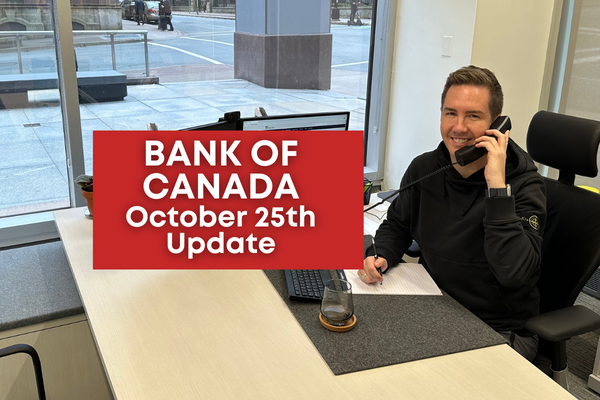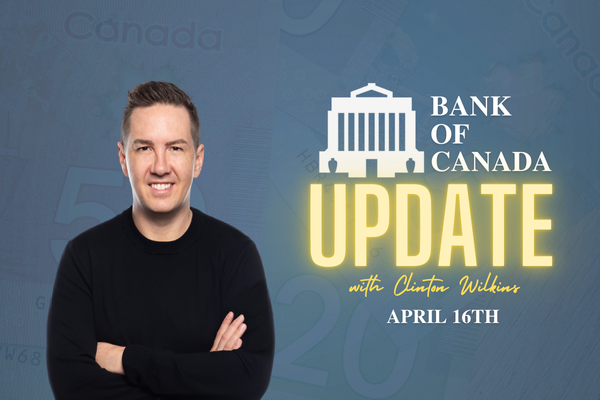On 95.7 News Radio, Clinton and Todd discussed the importance of credit monitoring due to rising fraud and data breaches.

Bank Of Canada – A Breath of Relief for Homeowners | October 25
Clinton Wilkins joins Sam Laprade on CityNews to talk about the latest update from the Bank of Canada. They discuss why homeowners can start to breathe more easy, the slow burn to softer rates, why it’s important to talk about your finances, and what homeowners can do to prepare for renewals.
00:01
The Sam Laprade show continues on CityNews 1011FM and 1310am.
Sam Laprade 00:11
And we’re back here on CityNews, I’m Sam Laprade, thank you so much for spending time with us. I get to speak with Clinton Wilkins, a number of times through the year because we always speak when the Bank Of Canada shares a new interest rate or a new announcement. Clinton joins us now. Hi Clinton.
Clinton Wilkins 00:27
Hi Sam, how are you?
Homeowners are starting to breathe easy
Sam Laprade 00:28
Good. Clinton Wilkins Centum Home Lenders ltd. We know Tiff Macklem, the Bank of Canada kept the key interest rate steady at 5% today. People breathing a little bit easier today, Clinton.
Clinton Wilkins 00:41
I think people are breathing easier. And I think they should breathe easy now Sam, I really do believe that we are in a plateau situation. I was in Toronto just last week at Mortgage Professionals Canada Annual conference, national conference. We were there with mortgage professionals from across the country. And Benjamin Hall, the chief economist for CIBC, he said that we will likely start to see softening, going in the middle of next year. So for anyone who’s still sitting on the fence and not sure you know, really what is this future going to bring? If everything still continues to go as it’s going right now some softening is likely in our future, June July next year.
Sam Laprade 01:21
Amazing. How are people feeling Clinton? What are you hearing from your clients?
Clinton Wilkins 01:26
I think people are still very nervous Sam. I can tell you that. We see clients in all walks of life. But I’m seeing a lot of professionals right now. We’re talking to doctors and lawyers and accountants and they’re really waiting to the very last minute especially with their mortgage renewals, with hoping that there’s going to be, you know, a magic being or something that you know, their lender maybe is going to give them a lower rate or there’s something better is going to become available in the marketplace. All the rates right now are high. So I think what people really need to do is what’s going to be right for themselves. You know, I’ve said before, when we’ve chatted that shorter term, fixed rates have been the most popular, you know, a three year fix, for example, has been one of our most popular products. But there’s really been a shift Sam the last couple of weeks. And in the last couple of months, more and more clients are choosing to take a variable rate again, if they can qualify with the hypothesis that it is going to be cheaper over the next several years.
Lower rates will take time
Sam Laprade 02:20
Okay. And you talked about the softening, when you speak about a softening how drastic is that softening?
Clinton Wilkins 02:29
I think it’s going to be a slow burn on the way down, you know, I think it’s always slower going down than it is going up. The Bank of Canada is always going to be biased to a higher rate. And they’re always going to be biased to causing a recession versus fueling the economy. So I think that’s one thing that we need to remember. They are a biased institution, and they’re always going to be more biased to a recession. And that’s really what they’re trying to do right now. And it’s working. You know, the interest rate increases that they’ve done over the last 18 months, are putting the economy into a recession type situation. And the real big challenges, and I do think the Bank of Canada is short sighted, the increases that they’ve done, they take 4, 6, 8, 12 months to really have the effects. So we’re going to be feeling the effects of these increases for months into years down the road.
Sam Laprade 03:23
Oh for sure. Because people think, okay, I can kind of make it work for six months. Maybe I’m pulling some savings, maybe I’m, you know, tapping into other other sources of revenue. But at that point, they’re like, I can only do this for so long. And then what’s our family going to do?
Clinton Wilkins 03:39
Exactly, I think the dollars and cents that are in a family’s pocket right now, Sam are really stretched very thin. And it’s not thin just due to these mortgage rates and the housing costs. The inflation is really being driven by, you know, food costs and fuel costs. There’s a lot of factors that are really impacting the day to day operation of a family’s household.
“There’s going to be a lot of demand coming back into the marketplace.”
Sam Laprade 04:00
And I always like to ask you about first time homebuyers. My heart just goes out to do anyone trying to buy a home here for the very first time in this country. Give us a sense of what you’re seeing Clinton, who are you meeting with?
Clinton Wilkins 04:14
To be completely honest with you, a lot of people that are buying homes right now are first time homebuyers. I think they were really fatigued over the last two and three years because the competition was just so fierce. And the people that are willing to get into the market now, Sam, are really prepared for the future. You know, we’re really I think getting in maybe at the height of the cost in terms of interest rates, and if they can qualify and get into the market now. I think in many cases, there’s not as much competition when they’re buying homes. And we know in many markets from across the country, some of the home prices are less than they really have been the last couple of years. So I think the people that are really entering the market and transacting are the people that are just getting into this property ladder.
Sam Laprade 04:56
And Clinton, we’ve heard the notion that the best time to buy real estate was yesterday but if it’s not yesterday, then make it today still, is that still a notion?
Clinton Wilkins 05:05
I think it is. Because the one thing that we need to remember is once the rates do start softening, there’s going to be a lot of demand and a lot of pent up demand coming back into the marketplace. Think about everyone who has not transacted the last 12 months. You know, Canadians have an unstageable taste, I think for credit, and they have an insatiable taste for buying and selling real estate. And some people were just sitting on the sidelines, due to affordability, maybe they couldn’t qualify. Or maybe they thought, you know what the rates are high, I’m going to wait for the rates to come down. There’s a balance between rates and purchase price. So is it better to buy a home at a slightly lower purchase price at a higher rate, or at a higher purchase price and a lower rate? The one thing I can tell you, rates change all the time. The challenge is if you buy a house at a certain purchase price, that purchase price is never going away. You own it.
Sam Laprade 05:58
Right. So that’s a huge benefit obviously.
Clinton Wilkins 06:02
I think it’s a huge benefit. And I think the competition is a lot less. You know, we always heard of these reports, where homes had 20, 30 offers, you know, buyers were going in with no conditions. That’s really shifted across the country. You know, I think buyers and sellers are definitely becoming, you know, more balanced in terms of the market, I think there’s more negotiation. And the offers that we’re seeing are definitely coming in with more conditions. So clients having financing conditions, inspections, and I think there’s a lot more negotiation happening.
Having conversations about finances
Sam Laprade 06:33
Okay, how many more times will we speak this year? It’s just one more time in December?
Clinton Wilkins 06:37
One more time, December 6, is the last announcement of the year. And why don’t I fall on my sword, and I’m going to predict right now that the Bank of Canada will do a hold on December 6.
Sam Laprade 06:51
I hope so Clinton, and it’s you know, I just worry about so many of my friends, we speak about these things. We never talked about these things, by the way before right?
Clinton Wilkins 07:01
It was taboo. It was taboo to talk about your finances.
Sam Laprade 07:04
It’s so true. But a lot of people were like oh I’m renewing or what did you get? Because they knew that I just bought a house last year and you know, all those conversations are happening. I really hope it holds steady. I know a number of people are really holding their breath for that. And of course, the premiers are really getting into it. They’re they’re communicating with Tiff Macklem, and really sharing what they’re hearing from, you know, people that are living in their provinces.
Clinton Wilkins 07:29
I 100% agree, Sam. And I think the one thing that, Bank of Canada isn’t just impacting homeowners, it’s impacting businesses and cost of credit. So it’s really impacting everyone. And the one thing that’s coming up is November is Financial Literacy Month, you know, you’re talking about your friends having conversations about their mortgage and about their finances. It’s a great time to have those conversations, you know, we’re going into the holiday season, let’s focus in November as Financial Literacy Month, and become more aware. And I think, having conversations like this, you know, on the radio, hopefully, it’ll break down some barriers.
How to prepare for renewals
Sam Laprade 08:00
I’m hoping. Can I just ask you, we’ve got a couple of minutes, I really want to ask you this question. Because it can feel really daunting. When I bought my new home, I get an email from my mortgage broker, and there’s this huge list of all the things I have to do. And it can feel so daunting on the other side of it Clinton, how do you sort of help people through that process? They have to, you know, provide, especially I’m self employed, and I’m a single mom. So I, you know, I basically asked my mortgage broker if he needed a pint of blood as well.
Clinton Wilkins 08:31
I hear that I hear that a lot.
Sam Laprade 08:33
Yeah so the list can be daunting to talk to us about it just being step by step, just one step at a time, right?
Clinton Wilkins 08:40
I think breaking it down is the best way to think about it, Sam, and I think if you’re going to be buying a home, or if you’re going to be doing a transaction, start with a pre approval, get all your documents together. You know, the one of the big things and you really hit on it being self-employed is more challenging. But I think it’s more because I’m getting to more and more Canadians are becoming self-employed every day. So for traditional financing, when you’re self-employed, we need a two year average of your of your income. And we need the proper tax returns and notice of assessment and a Statement of Account from CRA to confirm you don’t owe any income tax. And I find the number one challenge people have, especially when they’re transacting is finding the documents. Have all your documents in one place, save your documents and know where to find them. I think that’s a really good place to start. I think the other thing that was really important is, know what’s going on with your credit, monitor your credit going into a big transaction. You know, there’s free apps you can download, there’s Borrowell and Credit Karma, and you can really know what’s going on with your credit and and have a good idea about what your situation is going into that transaction. And I think the third thing is really assets. You know, know how much you want to put down. Know what your financial situation is going to be. And, you know, I think really work with that mortgage professional and figure out what your affordability is, because there’s two things. One is what you can be approved for and two is what you can really afford on a day to day basis.
Bank of Canada Predictions
Sam Laprade 10:00
Yeah really, really important. If you had, if you had a minute with Tiff Macklem, what would you say to him?
Clinton Wilkins 10:06
I would say that the Bank of Canada never gets it right. And I expect he will likely agree with me. You know, he was the one to say that the rates were going to be a low low for a really long time. And that was not the case. And, you know, the Bank of Canada is not really here to, you know, provide lower rates to Canadians and, you know, to spur the spending, they’re really worried about more of that fiscal policy, and controlling inflation. That’s a really number one target, at least from my purview. And the only lever that the bank can has to deal with inflation is this key overnight rate. I think my feedback is, we did a lot of increases very quickly, but we didn’t wait to see what those impacts were going to be. And really how long it takes from an increase to actually seeing the impacts of inflation.
Sam Laprade 10:55
Really interesting. Well, you just never know maybe Tiff Macklem from the Bank of Canada is listening right now to CityNews.
Clinton Wilkins 11:00
I would say he quite possibly could be in our nation’s capital. And, you know, I think that a lot of people are certainly were waiting for today, Sam, and I hope that people will breathe a little bit easier going into the rest of the year.
Sam Laprade 11:13
For sure, good night’s sleep tonight. Clinton, thank you for your time.
Sam Laprade 11:17
Thanks, Sam. Have a great day.
Sam Laprade 11:18
You too. Clinton Wilkins joining us from Centum Home Lenders Limited we appreciate his time. When we come back Jennifer Madigan. Stay with us on CityNews.
Sam Laprade 11:29
Sam Laprade will be right back on CityNews, 1011 FM and 1310am


